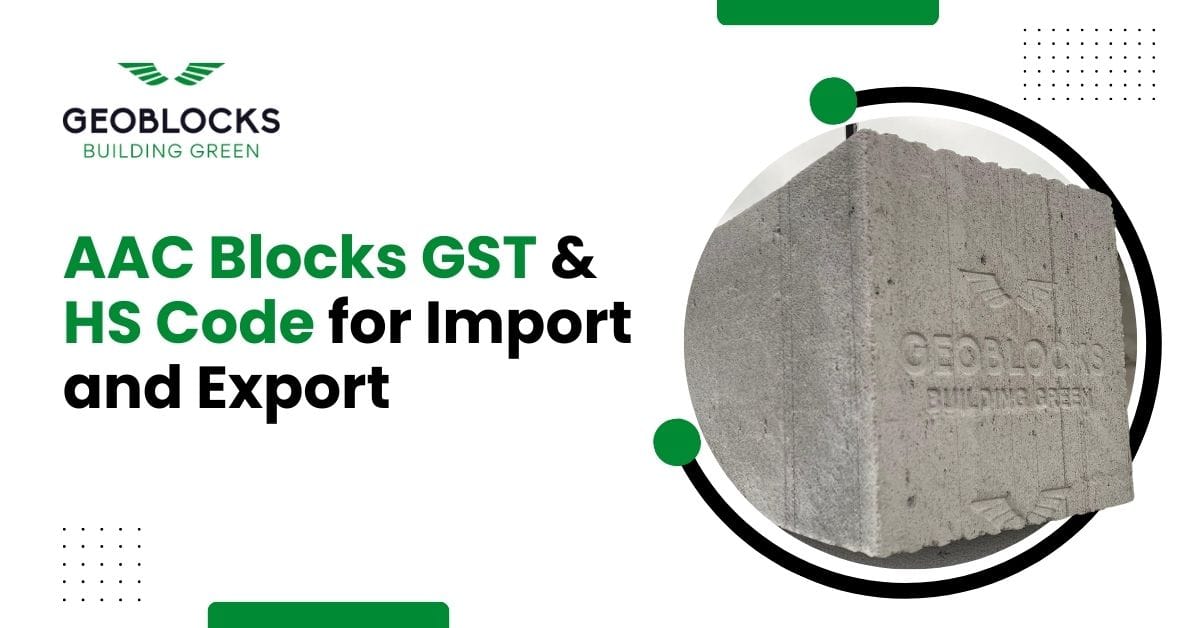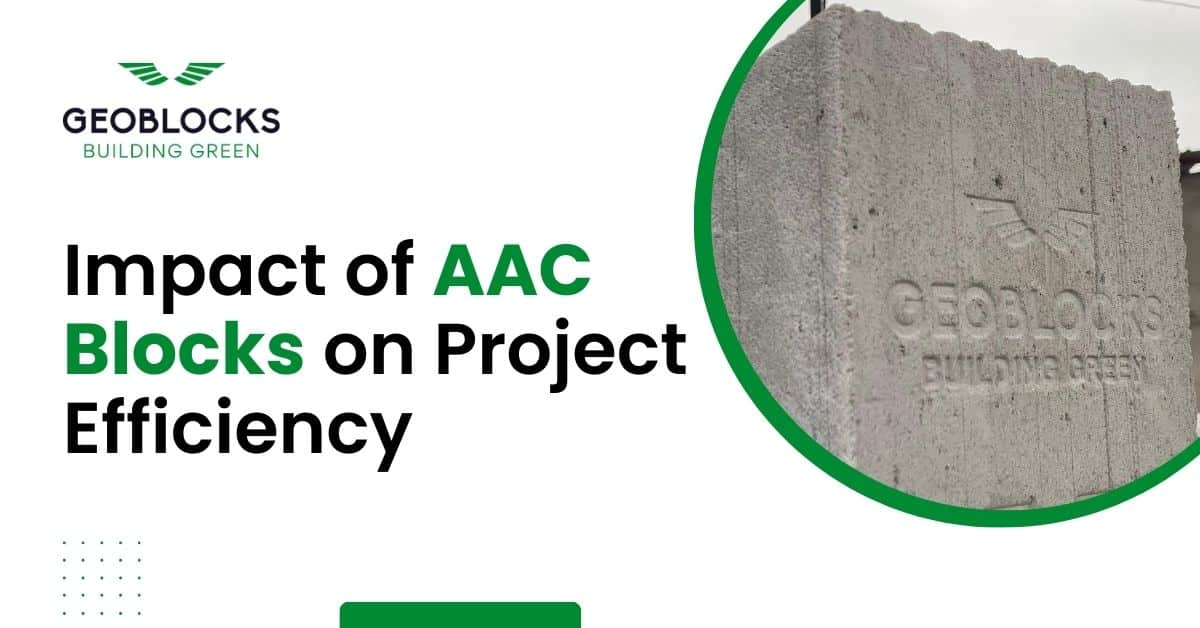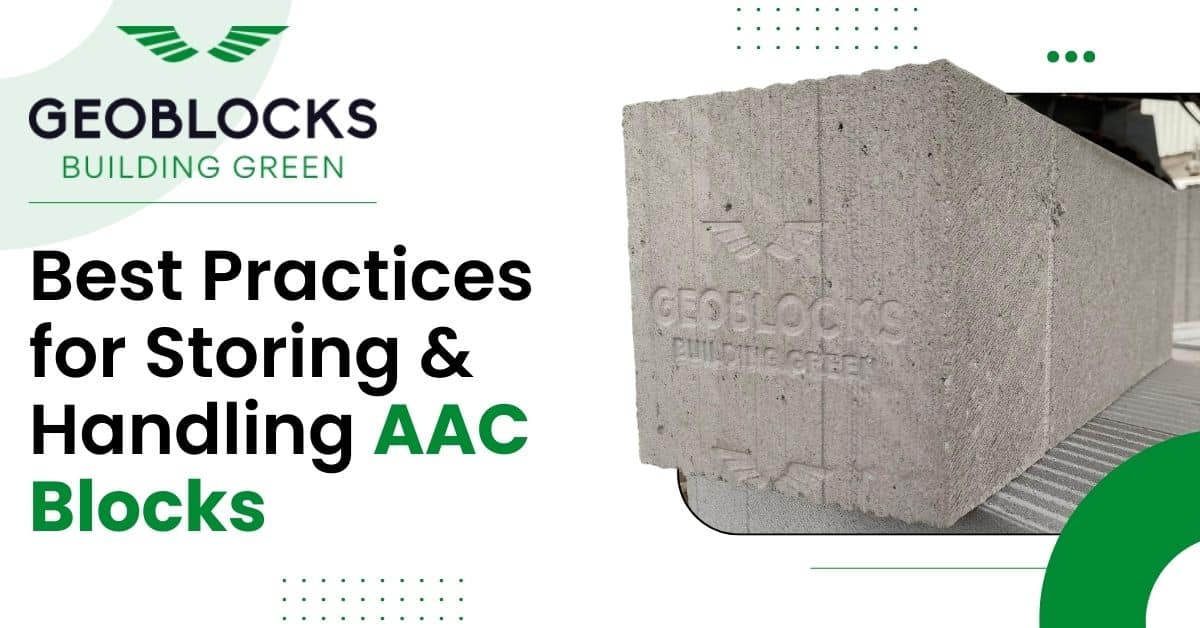Installing AAC blocks the right way is crucial for long-lasting, energy-efficient, and eco-friendly construction. Whether…

Autoclaved Aerated Concrete (AAC) Blocks have become a widely used construction material due to their lightweight, durability, and energy-efficient properties. As they continue to gain popularity in India and worldwide, understanding the Goods and Services Tax (GST) Rates and Harmonized System (HS) Codes for their import and export is crucial for businesses involved in the manufacturing, distributing, and trading of AAC blocks. This article will provide a comprehensive overview of the GST Rates and HS Codes related to AAC blocks for import and export.
What Are AAC Blocks?
AAC Blocks are a type of precast building material made from natural raw materials like Cement, Lime, Fly Ash, and Water. These blocks are cured in an Autoclave, which makes them lightweight, fire-resistant, and soundproof. Due to their eco-friendly and energy-saving properties, AAC Blocks are widely used in Modern Construction, replacing Traditional Clay Bricks.
Understanding AAC Blocks GST Rates
In India, AAC Blocks fall under the Goods and Services Tax (GST) regime. The applicable GST Rate for AAC Blocks is 12%. This rate applies to both the supply and purchase of AAC blocks in the domestic market.
Here’s how the tax is structured:
- CGST (Central Goods and Services Tax): 6%
- SGST (State Goods and Services Tax): 6%
This means that if you are selling or purchasing AAC Blocks within a state, the 12% GST will be equally divided between CGST and SGST.
For interstate trade, the same 12% GST rate is charged as IGST (Integrated Goods and Services Tax).
HS Code for AAC Blocks
When dealing with international trade, the Harmonized System (HS) Code is essential for identifying products and regulating trade across borders.
AAC Blocks HSN Code is 68159910
This HS code is used for “Articles of cement, concrete or artificial stone, whether or not reinforced,” which includes AAC blocks.
Why is the HS Code Important?
The HS Code helps businesses:
- Identify the product category for import/export regulations.
- Determine the applicable customs duty, if any.
- Ensure compliance with international trade norms.
It is critical to use the correct HS Code to avoid delays or penalties at customs during international shipments.
Import and Export of AAC Blocks: Key Considerations
1. Customs Duty and Charges
When importing or exporting AAC blocks, businesses must be aware of customs duties and charges applicable in both the origin and destination countries. While the GST rate is applicable domestically, customs duties depend on the bilateral trade agreements and import/export policies of each country.
2. Documentation
To ensure a smooth import/export process, the following documents are typically required:
- Invoice
- Bill of Lading or Airway Bill
- Packing List
- Import/Export License
- Certificate of Origin
- GST Registration Certificate
3. Shipping Considerations
AAC Blocks are lightweight but bulky, which can increase shipping costs. Companies engaged in international trade need to plan their logistics carefully to minimize costs while ensuring timely delivery.
4. Quality Standards
Exporting AAC Blocks requires compliance with international quality standards. Importing countries may have specific regulations regarding the strength, size, and thermal properties of AAC blocks, which need to be met for successful trade.
Frequently Asked Questions
What are AAC Blocks?
AAC (Autoclaved Aerated Concrete) Blocks are precast building materials made from cement, lime, fly ash, and water. They are lightweight, fire-resistant, soundproof, and eco-friendly, making them a popular choice for modern construction.
What is the GST Rate for AAC Blocks in India?
The Applicable GST Rate for AAC Blocks in India is 12%. This is divided into:
- CGST (Central Goods and Services Tax): 6%
- SGST (State Goods and Services Tax): 6% For interstate transactions, the same 12% is charged as IGST (Integrated Goods and Services Tax).
What is the HS Code for AAC Blocks?
The HS Code for AAC Blocks is 68159910, which categorizes them under “Articles of cement, concrete or artificial stone, whether or not reinforced.”
Are there any Customs Duties on AAC Blocks for Import/Export?
Customs duties on AAC Blocks depend on the bilateral trade agreements and the import/export policies of each country. It is essential to check the specific duties applicable in the countries involved.
What Documents Are Required for Importing or Exporting AAC Blocks?
Typically, the following documents are required for importing/exporting AAC blocks:
- Invoice
- Bill of Lading or Airway Bill
- Packing List
- Import/Export License
- Certificate of Origin
- GST Registration Certificate
How does the Weight of AAC Blocks affect Shipping Costs?
While AAC Blocks are lightweight compared to traditional bricks, their bulky nature can increase shipping costs. Proper logistics planning is essential to balance shipping expenses with timely delivery.
What Quality Standards must AAC Blocks meet for Export?
AAC Blocks must comply with international quality standards regarding strength, size, and thermal properties. Exporting countries may have specific regulations, and ensuring compliance is crucial for successful international trade.
Can Businesses claim Input Tax Credit (ITC) on AAC Blocks?
Yes, businesses can claim an Input Tax Credit (ITC) on the 12% GST paid for AAC Blocks, which helps reduce the overall tax liability.
Conclusion
For businesses dealing with AAC blocks in India, understanding the GST Rate of 12% and using the correct HS Code 68159910 for international trade is vital for seamless transactions. Whether you are importing or exporting AAC Blocks, staying compliant with the regulations ensures your business runs smoothly and efficiently.
If you’re looking to streamline your AAC block trade operations or need expert guidance on handling the legal and documentation processes, feel free to Get in Touch with GEOBLOCKS, one of the leading AAC block manufacturers and suppliers. We offer comprehensive solutions for all your AAC block needs, including bulk supply and international trade services.




